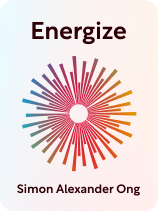

This article is an excerpt from the Shortform book guide to "Energize" by Simon Alexander Ong. Shortform has the world's best summaries and analyses of books you should be reading.
Like this article? Sign up for a free trial here.
Is it possible to be energetic all the time? Why are relaxing breaks important for your health?
Before you start to get the impression that you should be energetic all of the time, Simon Alexander Ong says that’s far from the truth. Instead, you should think of your energy as a valuable resource that must be carefully managed.
Find out how to replenish your energy so you can have it when you most need it.
Replenish Your Reserves
You can learn how to replenish your energy by giving yourself time to relax, avoiding doing things that will pointlessly drain you, and cultivating relationships that give you energy instead of taking it away.
First, Ong writes that it’s important to know how your energy fluctuates throughout the day. You may already be aware of your patterns, but you should still track your day’s highs and lows so you can schedule your most important tasks for when your energy peaks. You should also schedule breaks, since daily life will often find ways to distract you from relaxing. Ong is in favor of using your breaks to clear your mind instead of seeking further distractions like the internet. It’s when your mind is at its most quiet that your best ideas can bubble to the surface. Quiet time also lets your energy recover—whether you’re strolling through a park or meditating in your office. Like sleep at night, breaks during the day are vital to staving off energy exhaustion.
(Shortform note: Though people’s energy patterns are roughly similar, every person’s is unique to some extent. In When, Daniel H. Pink explains that over the course of a day, most people experience a predictable energy pattern—a crest, a slump, and a recovery. While this pattern is universal, the time of day that the pattern begins varies depending on your chronotype—the individual expression of your body’s rhythm. There are three common chronotypes: morning people, night owls, and those whose schedule falls somewhere in between. Knowing your chronotype will give you greater insight into your daily rhythm, so you can plan effectively for your highs and lows as Ong suggests.)
Ong says that as important as it is to know your energy cycles, you also need to determine what takes energy away from you and set up barriers against it. In today’s world, your energy is constantly under attack by distractions such as emails, phone calls, meetings, to-do lists, and a barrage of social expectations. All these things can siphon energy from you at times when you need it most, so you may have to set up deliberate walls—turning off your phone, closing your office, and scheduling time for uninterrupted focus. The hardest part may be learning to turn down requests from friends, family, and colleagues that will take you away from pursuing your goals. You can set boundaries gracefully, but nevertheless, they should be firm.
(Shortform note: Many of the modern world’s energy drains aren’t accidental—they were designed that way. The information industry has fine-tuned its tactics to steal your energy to such a degree that it takes a concerted effort to resist. In Make Time, Jake Knapp and John Zeratsky suggest ways to protect your energy from digital media, some of which may seem draconian. For example, they recommend deleting all social media apps and even your email from your phone. Don’t respond to emails until the end of the day, and severely curtail your TV habits. Like Ong, Knapp and Zeratsky also recommend learning to say no to other people’s requests, and they even suggest rehearsing a script for saying no if you find it hard to do.)
Surround Yourself With Energy
While many things steal your energy, Ong argues that strong, beneficial relationships give you energy in abundance. For instance, you should engage with high-achieving people in your field, such as entrepreneurs or innovative thinkers who’ll challenge you to reach beyond your comfort zone and elevate your ambitions. However, be careful not to surround yourself with people who think just like you do. Instead, when building your personal network, seek a wide range of perspectives—people with different backgrounds bring different types of energy into your life, whereas conformity adds nothing fresh. Be sure that you contribute energy back to your network, because the energy you offer will call out to those with energy to match.
(Shortform note: In The Motivation Myth, Jeff Haden suggests practical steps to making the best of Ong’s advice. He suggests that you pick a high-achieving professional to emulate, study how they achieved their goals, and determine the steps they took. You can also join a group such as a professional organization that will put you in touch with many people whose personal experiences you can draw from. Once you’ve become part of a community of people working toward similar goals, you’ll not only have access to experts to learn from, but you’ll also have found an invaluable network of support to motivate you along your path.)
Beyond the quality of your personal connections, Ong stresses that loving, supportive relationships significantly contribute to your sense of energy and your personal growth, citing research that shows that a healthy relationship, particularly with a spouse or partner, is the best predictor of overall life satisfaction. People with supportive partners are more likely to recognize and follow opportunities, leading to greater success and happiness. Putting your energy into nurturing a loving relationship with someone who reciprocates in kind creates an environment filled with positive energy that will extend to all the other aspects of your life.
(Shortform note: Though Ong promotes the value of traditional romantic relationships, those aren’t the only type of personal connections you can use to bring energy into your life. In The Art of Happiness, the Dalai Lama points out that “intimacy” takes so many forms that you can—and should—establish many types of intimate relationships with many different people. For instance, you can forge a relationship with a friend that’s based on your common interests, or an intimate relationship with a fellow parent based on your shared experience of raising children. The Dalai Lama asserts that we’re all dependent on others for our well-being and that we need interactions with others to make us happy.)

———End of Preview———
Like what you just read? Read the rest of the world's best book summary and analysis of Simon Alexander Ong's "Energize" at Shortform.
Here's what you'll find in our full Energize summary:
- How to cultivate and replenish your energy
- Why your personal energy can be infectious
- How money can give you energy and take it away






